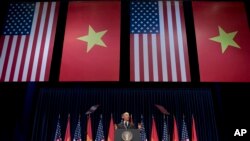The recent abolition of a long-standing arms embargo on Vietnam is a "largely a symbolic one," Assistant Secretary of State Tom Malinowski told VOA in an exclusive interview Friday.
Following up on last month's historic White House decision to fully lift the half-century-long ban on sales of lethal military equipment to the Southeast Asian country, Malinowski said every weapons purchase by Hanoi will be linked to its progress on human rights.
U.S. President Barack Obama's partial lifting of the ban in 2014 drew sharp criticism from human rights advocates and some U.S. lawmakers, and not everyone has welcomed the president's latest decision to completely end the embargo.
House Foreign Affairs Committee Chairman Ed Royce, a Republican, issued a statement noting the administration has now lost leverage to press Vietnam, which is poised to join the U.S.-led Trans-Pacific Partnership (TPP), on its poor human rights record.
"I don't think the decision the president announced changes in any way the amount of leverage we have," Malinowski told VOA. "In fact, you can argue that we have more because we now get to take Vietnam's human rights progress into account every time they ask for a particular weapon purchase."
Before Obama's trip to Vietnam, Human Rights Watch sent the president an open letter arguing against lifting the ban, saying that Vietnam's human rights record remained "dire in all areas," with imprisonments of activists and bloggers, restrictions on free speech and regular police torture.
Describing human rights as a priority in the U.S. relationship with its former enemy, Malinowski said terms of the ambitious trade pact will only increase U.S. influence.
"We've incorporated human rights concerns into TPP and into our discussions with Vietnam on the security relationship," he said. "Before TPP there was no obligation on the part of the government of Vietnam to change its labor code. Now Vietnam has that obligation, it has to meet the obligation in order to get the benefits of the trade agreement."
Although Vietnam-U.S. relations have strengthened in recent years, Malinowski said further progress will "depend on continued progress toward a more open society inside Vietnam."
